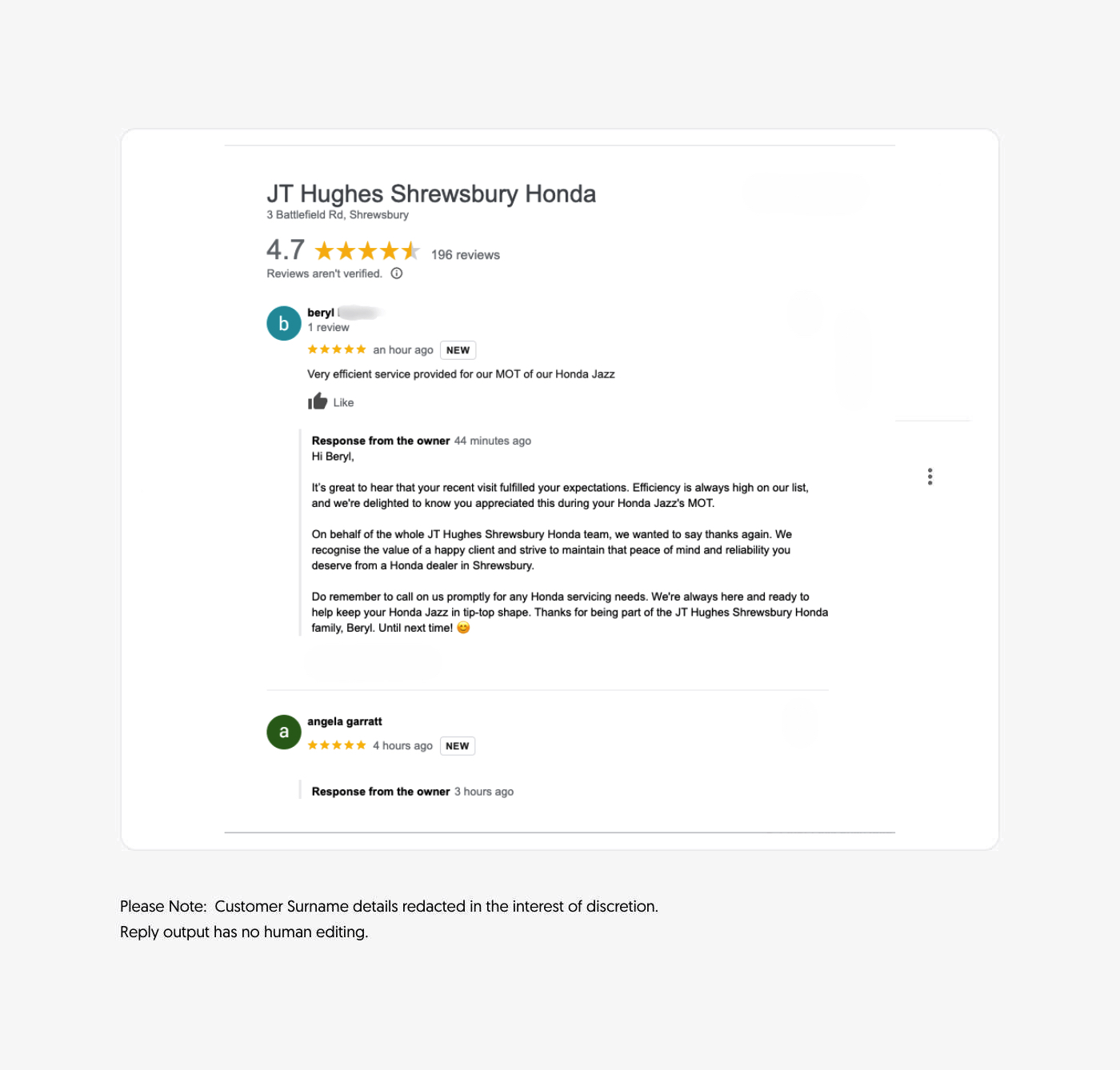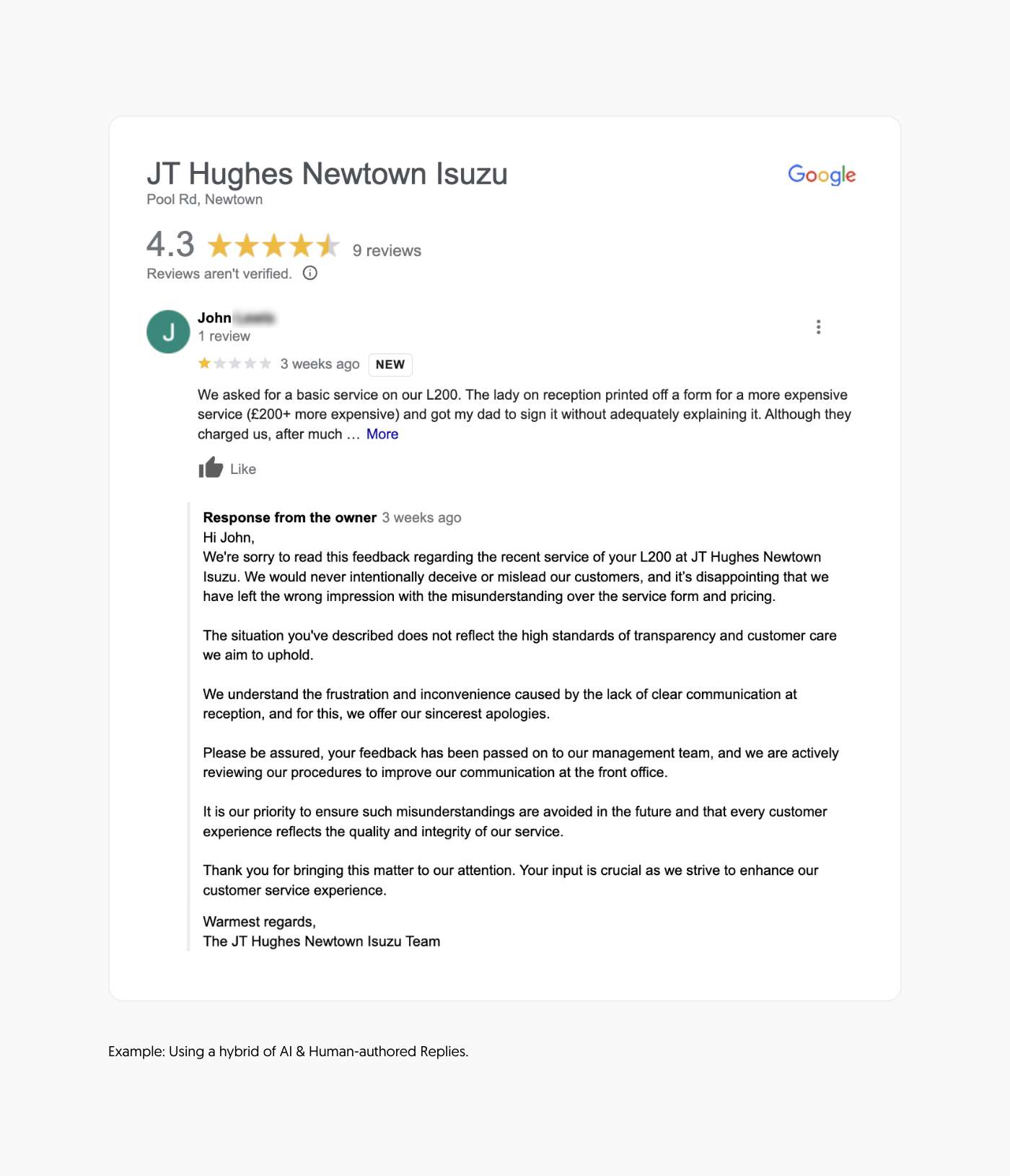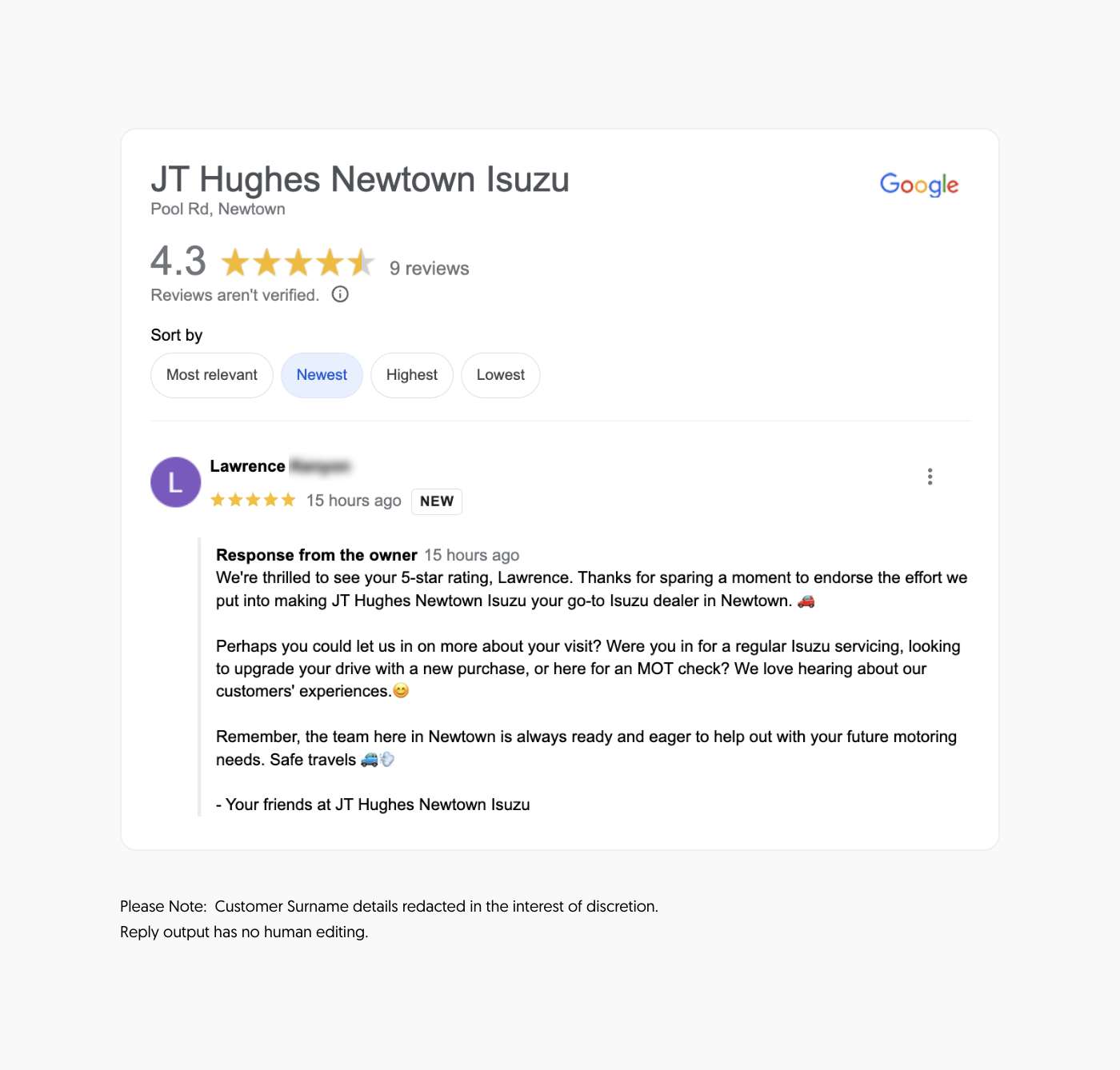Whether you're a franchised car dealer, independent, or lease broker, failing to respond to reviews, giving empty platitudes, or delaying your response is a huge red flag, potentially harming your reputation, diminishing lead generation, and undermining sales conversions.
Responses to reviews at your dealership are read by not only customers who have recently purchased or serviced a vehicle, but also by prospective buyers at a crucial stage in their car-buying journey.
Most car buyers tend to read reviews—and responses—just before committing to a purchase.
In this post, we'll delve into the challenges of effectively responding to customer feedback and how AI review responses for car dealerships in the UK can revolutionise this crucial aspect of review management.
Overwhelmed by multiple platforms.

As a best practice, each review on each platform deserves a personalised, sensitive reply.
But the digital landscape is growing so quickly: your customers are leaving reviews on Google, Trustpilot, JudgeService, social media, and more.
And with every new review platform, your sales and admin teams are forced to re-prioritise the channels in their review response strategy because they can't manage all of them.
The sheer number of reviews that require responses can overwhelm car dealerships, and the quantity of reviews increases exponentially for multi-franchise dealerships.
Lack of time and training.
Even if your dealership has enough human resources to respond to every individual review site, do they have the time or training to craft well-written, empathetic responses?
The demands of their primary duties leave little opportunity for the careful consideration needed to address customer feedback effectively.
Furthermore, without specific training in empathetic communication, responses may not fully resonate with the customer's concerns or emotions.
They could also be inconsistent with your dealership's brand and customer service style, resulting in responses that are generic and, quite frankly, tone-deaf.
This haste to address feedback can also lead to delayed, superficial, or grammatically incorrect responses, which can tarnish your dealership's professional image.
Not SEO optimised.
Many dealership personnel lack training in crafting SEO-optimised review responses, which are essential for increasing online traffic and enhancing your dealership's visibility.
Google reviews are indexed by search engines, which means that when someone searches for your dealership name and finds a review instead of an official page, that review is valuable in terms of search engine optimisation (SEO).
Can AI respond to dealership reviews?
These challenges highlight the necessity of a structured and strategic approach to customer feedback management.
As responding to reviews gains importance, many dealerships have turned to AI for an efficient solution or are considering it.
Incorporate AI into your review response strategy.
It's clear that humans have limited bandwidth, and AI's infinite scalability isn't exactly helpful when errors come up in consumer-facing communications.
But if you combine the empathy and knowledge of your team with the right AI review response technology, you can augment your review response strategy.
The key is to rely on your team, not replace them. They have the necessary skills for support, and AI should magnify that, not replace it.
Training your AI-Response Assistant.
The effectiveness of AI-generated responses depends heavily on the quality of directions it receives, known as "prompt engineering."
Crafting instructions that align with your dealership's brand and customer service style is vital.
Without intuitive AI training (prompt engineering), the output may be repetitive, too long or too short, mis-capitalised, poorly punctuated, using incorrect first- /third-person tenses, or result in an unfortunate combination.
By programming the AI response assistant with precise prompts and customisable variables, you can ensure that responses adhere to grammatical standards and effectively represent your dealership's voice.
The best way to use AI for review responses.
Positive Reviews (4 & 5 Star Ratings).
With the right AI solution and after thorough testing, positive reviews can be fully automated, often exceeding the output quality of sales and admin teams.
However, especially in the initial months following AI deployment, it's critical to keep humans in the loop for all review responses to ensure accuracy and to fine-tune nuances as needed.

Negative Reviews (1 & 2 Star Ratings).
Responding to negative reviews should always involve humans due to the time and sensitivity required.
However, AI can be invaluable in creating first-draft responses, providing a starting point for human reviewers to save time.
Instead of starting from scratch, your team can review the AI's draft, make necessary edits, and move it to the publish queue.

Positive No Context Reviews (Star Ratings Only).
In our fast-paced world, customers often express satisfaction simply with a 4 or 5-star rating without text.
AI excels here by acknowledging these ratings with a thank-you message and inviting more detailed feedback when convenient.
This not only maintains the customer relationship but also offers an opportunity to integrate SEO keywords, enhancing the dealership's online presence.

Selecting AI Review Response Tools: Dos and Don'ts.
If you're enhancing your review response strategy with AI, look for a tool that eases the transition between AI-assisted and manual processes. Essential features include:
- Tone adjustment to match your communication style.
- Responses to no-context reviews.
- Selection of star ratings to determine which reviews get an automated reply.
- Emoji inclusion for humanised responses.
- Key information integration, such as customer and dealership names.
- Randomised and subtle upsell suggestions for F&I products.
- Recognition of important dates like Christmas.
- Easy-to-read text formatting with paragraph breaks.
Integration with multiple review platforms.
Integration through AI is designed for automation, simplifying the process of collecting and posting review responses.
This integration involves two distinct functions:
Collection: This function enables the gathering and management of reviews from multiple platforms into a single system.
Push Responses: This allows for the automatic posting of AI-generated responses back onto the review platforms, eliminating the need for manual copying and pasting.
The availability of these options varies by review platform, as each platform offers different levels of integration capabilities.
Pulls in important dealership information.
Consider all the details about your dealership that customers might require: your location, business hours, products and services, and customer service contact information.
These elements are often crucial to include in responses, necessitating an AI response assistant that is well-informed about your dealership's context.
To ensure this, seek a review response tool capable of learning from your structured data, such as the content in your Content Management System (CMS).
Administrative Controls for Brand Protection.
Administrative controls are essential. Maintain oversight with manual approval and transition to full automation when confident in the AI's performance.
It's important to manage user permissions effectively to fit your team's structure.
For any AI response tool, your team leader needs the ability to restrict or grant user permissions.
You may have some users that simply review and approve or deny the AI-generated reply, or you may have other users that have the permissions to edit review responses.
However, your team is structured, make sure the review response tool can accommodate it.
Custom AI for Dealerships vs. General Reputation Management AI.
A custom-developed AI response assistant for car dealerships can offer more nuanced interactions compared to general reputation management software that includes a generic AI response feature.
Although some reputation management software permits customisation of prompts, it often demands significant time and expertise.
Without skilled prompt engineering—the art of giving precise instructions to an AI bot on responding to different types of reviews—the results can be monotonous, overly verbose or too brief, miscapitalised, poorly punctuated, or use incorrect narrative perspectives, potentially combining these issues.
A dealership-specific AI response assistant can provide more personalised and accurate engagement, tailored to meet the distinct needs of the automotive retail industry.
Whether you're utilising a dealer-specific AI solution or a reputation management system with an AI response capability, it is essential that the prompts are expertly designed.
This precision ensures that it outputs responses that are not only grammatically correct but also personalised, individualised, and include SEO-optimised replies.
Conclusion.
AI-powered review responses can transform your dealership's management of customer feedback, enabling empathetic, brand-aligned interactions with your customers when combined with your team's efforts.
This hybrid approach between people and technology can save numerous hours, significantly lighten the administrative load, and enhance the speed of responses, bringing considerable time and cost savings to your dealership.
With the right safeguards and a suitable AI review response tool, you can keep a genuine, human warmth in your AI-generated responses. This balance ensures customers remain happy and boosts your brand's reputation, all without overtaxing your team.